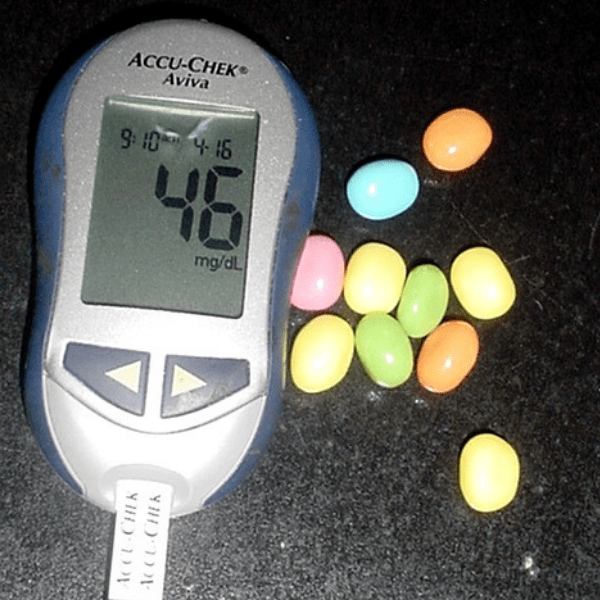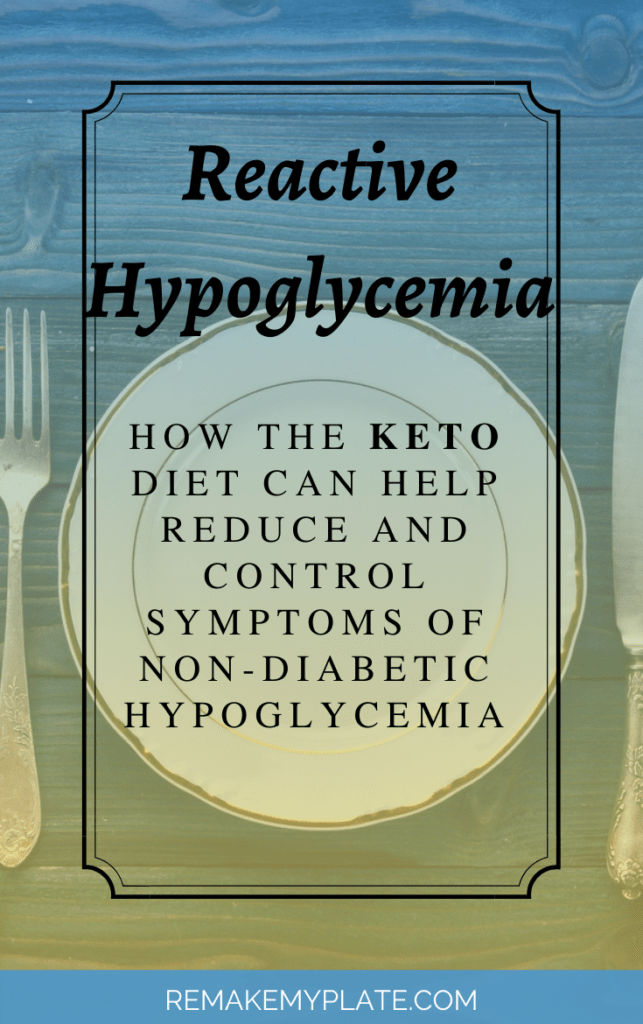Ah….reactive hypoglycemia (aka RH).
The below pictured blood sugar level was obtained by eating a handful of jelly beans.
As you can see I did NOT finish eating handful number 2 which contained about 15 or so jelly beans. My sugary enjoyment was cut short when the sweating, blurry vision, heart palpitations and shakes suddenly kicked in.

At first I started to feel funny.
Then the sweating kicked in.
This was followed by my thinking slowing down.
I thought maybe I was having a reaction and checked my blood sugar level.
It read 46. That’s very low. I grabbed a bit of juice and drank a small glass. Before the sugar in the juice started to bring my blood sugar up blue flashes of lights started to pop up into my vision. Thankfully the juice helped before my blood sugar got any lower.
I have RH. Jelly beans aren’t the best treat. Here’s why…..
What is reactive hypoglycemia?
Reactive hypoglycemia are episodes of low blood sugars that occur somewhere within 4 hours after eating a high carbohydrate meal. While hypoglycemia reactions are generally thought of happening to those who are diabetics, reactive hypoglycemia can also occur in those who are not diabetic.
What causes reactive hypoglycemia?
While the causes can vary some general reasons might include that some people are more sensitive to the hormones that play a role in controlling blood sugar levels (glucagon, insulin, epinephrine, etc).
Others might over secrete these hormones when it’s not necessary due to people have metabolic issues (both genetic and surgery related) that can cause these hormonal reactions.
For some, surgery on their stomach, such as bariatric surgery, is a cause of their reactive hypoglycemia.
No matter what the cause, the body is over reacting to the presence of carbohydrates causing blood sugar levels to drop to abnormally low levels.
In some cases symptoms are also felt when blood sugar levels drop quickly in an extremely short period of time but the final blood sugar level does not go below normal. Huge drops happening in 10 or 15 minutes feel just as horrible as low blood sugar levels. Trust me on this one.
How is reactive hypoglycemia diagnosed?
Your doctor can have your HbA1c level tested. It tests the average blood sugar level you’ve had over the last 2 or 3 months. The only problem with this test is how often your experiencing these drops. If they happen once in a while your HbA1c will most likely be normal. This is because it’s an AVERAGE. If your blood sugar levels are normally within a range of 70 to 100 mg/dl but you have 3 or 4 drops into the 40’s then your average over several months might still show up normal.
Another method to test for RH is to have a 3 or 6 hour glucose tolerance test. For this test you fast before drinking a drink that contains glucose. Your blood is then drawn over the test time so they can watch how you react and what your blood sugar levels are doing.
Of course, if you suspect RH, testing your blood sugar levels during any episodes you might experience can help your doctor to diagnose you as well. Keep a log with what you ate before the symptoms occurred, what your symptoms are and your blood sugar level if you tested.
Types of reactive hypoglycemia
- Congenital enzyme deficiencies: these are genetically caused and include conditions such as hereditary fructose intolerance and galactosemia.
- Hormonal hypoglycemia: sometimes experienced by those with hypothyroidism
- Late hypoglycemia: occurs when there is a delay in early insulin release from pancreatic beta cells. This results in a high spike in blood sugar followed by a late drop in blood sugar levels (4 to 5 hours later instead of the usual 2 to 3) when the glucose tolerance test is performed.
- Post gastrectomy Alimentary Hypoglycemia: this results from rapid emptying of the stomach contents after a meal. In surgical weight loss patients this is similar to “dumping” that occurs after eating a high carb meal. This does not just occur in weight loss surgery patients but in others who have had some type of stomach surgery (ex: surgery due to stomach cancer).
Symptoms of reactive hypoglycemia
(usually occur within several hours of eating)
- flushing and sweating
- blurry vision, hazy vision
- heart palpitations or fluttering
- dizziness, lightheadedness
- tremors, shaky hands
- nervousness, irritability, panic attacks, depression
- trouble thinking, confusion
- headaches, nausea, vomiting
- fatigue
- sudden increased appetite, craving certain foods such as sweets/junk food
- extremely low blood sugars can result in seizures and even coma if not treated
Treatment for reactive hypoglycemia
While some cases may require medication to control the release of glucagon, if that is the cause, most people control their RH through diet. A keto, low carb or controlled carb diet can help to greatly reduce RH episodes. The following is generally recommended:
- eat small meals and snacks every couple of hours to maintain blood sugar levels
- avoid eating meals that are mostly carb based
- limit your sugar intake (drinks such as specialty coffee drinks are especially sneaky sources of sugar)
- if eating carbs choose foods that are high in fiber to help delay the absorption of sugars by the body
- always include a bit of protein and fat when eating carbs, again, it helps to delay the body absorbing the sugars that make up the carbs
- when eating grains avoid highly processed ones – stick with whole grains (see the fiber note above)
- avoid rapidly absorbed sugary foods such as soft drinks, candy, cakes, cookies, etc
- limit alcohol – it can cause crashes too
- exercise on a regular basis
A few extra tips:
ALWAYS carry some type of snack as well as a glucose based candy (Smarties candies are glucose) or other commercially available product to eat in case you have a reaction while away from home. Always. Better safe than sorry.
I’m sure this probably doesn’t need to be said but I’m going to mention it anyways. If you think you are experiencing symptoms while driving STOP!
I know I’ve personally gone from fine and walking around to confused and unable to focus in minutes. Thankfully it’s been while I’m at home or some place where I can ride it out until my blood sugar levels return to normal.
When your at the point that you can’t explain what is happening to people around you then driving, or continuing to drive, is a recipe for disaster.
Please remember, I’m not a doctor and don’t play one in real life. I am just someone who has personal experience with RH. If you have RH or think you do please contact your doctor and get treatment.

Want to get new recipes sent directly to your inbox? Then subscribe to our newsletter (see below) and be the first to know when we post a new recipe as well as get weekly shopping, cooking and meal planning tips. Follow me on Pinterest where you can find links to our recipes as well as other recipes you and your family will enjoy.
This post may contain affiliate links. Please see our disclosure policy. If you click on the banner below you will be taken directly to my Etsy shop to see the digital items currently listed.


